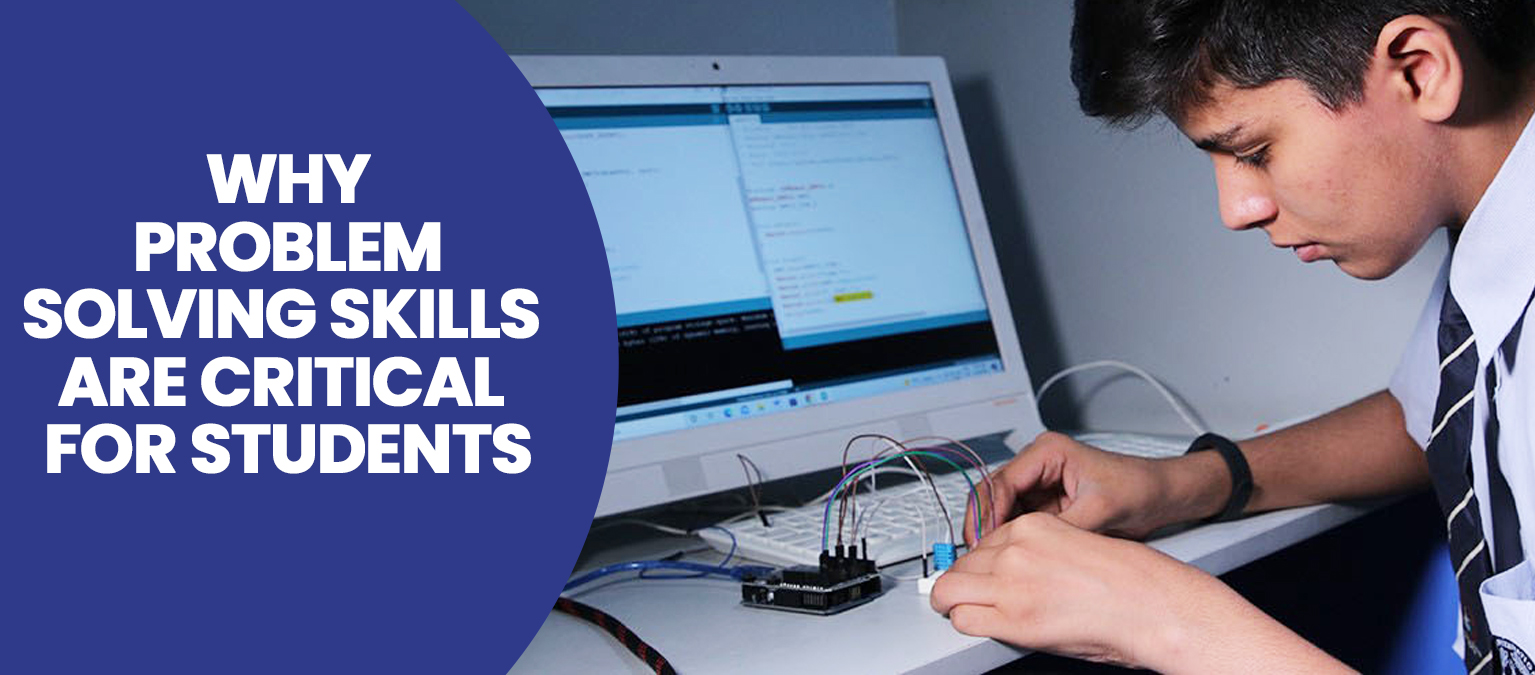Why Problem Solving Skills Are Critical For Students?
May 10, 2023
Problem-solving skills equip students with the ability to think critically, adapt to new situations, and excel in academics and future careers, fostering lifelong success

Problem-solving abilities refersto our capacity to analyze issues in depth and quickly come up with workable solutions.Our capacity to bounce back swiftly from adversity& difficulties is referred to as resilience.
Rainbow and children have symbolic meaning.After darkness and rain, the rainbow serves as a reminder of positivity. In the similar manner, children remind us that there’s a better tomorrow and help us build more strength and resilience. But with the evolving world around us, with increased competition and academic responsibilitiesfor children. They can face challenges in day to day life.To manage all the obstacles coming in their path they need to develop good problem solving skills to believe in themselves and move forward in life with confidence and optimism.
Discovering Problem Solving skills
Children develop problem solving skills at a very young age. It begins when they start to fix their broken toys while using hit and trial method. Problem solving involves defining a problem, figuring out its root cause, identifying, ranking, and choosing potential solutions, as well as putting those solutions into action.One of the most crucial abilities children may learn is how to solve problems since it equips them to handle more difficult scholastic and social problems as they get older.
Every child learns at their own speed and has a unique set of strengths and skills. As a result, it's important to teach them how to tackle problems and problem-solving with determination and creativity.It's also crucial to remember that not every problem calls for the same approach. Children, for instance, wouldn't approach finishing an academic project the same way they would manage a conflict in friendship. Therefore, it's helpful to remember that there are various types of problems and that each problem has to be managed differently.Children can learn which kind of problem-solving approach will be most effective based on the situation by understanding various forms of conflicts.
Why is problem solving crucial for a child's development?
- Improve Curiosity & confidence.
People with effective problem-solving abilities becomes innovative and independent by learning through their experiences. Also, they build confidence as it encourages them to believe in their abilities.
- Better Decision making
It helps them make rational decisions and not to be dependent on others for it.
- Problem solving helps students do better in academics
It enables them to deal with various factors coming in their way and reach their academic goals.
- Improved social relationships
It help them develop healthy relationship as they are capable of managing conflicts in relationship and builds better social skills.Effective problem solving skills also encourages students for team work. It enhances collaboration and promotes new leaders.
- Enhances critical thinking
Problem solving skills improves cognitive abilities like attention, focus and memory. Also, Cause and effect are more deeply understood by students who can solve problems effectively. Hence, Critical thinking skills are also improved.
- Develops patience
Children also develops patience while solving problems effectively which helps them in taking calculated risks.
- Build’s resilience
Finally, it helps children be adaptable to change and build resilience towards difficult circumstances.
How parents can encourage Problem solving skills?
Children look up to their parents as role models. At a very young age, they begin to observe and pick up problem-solving skills from watching their parents.Parents should encourage their children to solve problems by appreciating them even when they fail. Moreover, by emphasizing to them that it is a crucial aspect of life.
- Help to identify the problem
Children occasionally go to their parents when they are upset about an issue. Here, parents can actually assist their children in identifying the problem by asking appropriate queries. Children can learn to recognize problems, as well as what problems they can fix and what things are beyond their control.
- Balance between autonomy & support
Children do require parental help, but parents must remember that children often learn best from the process of trying and failing. They ought to be given the autonomy to think of a solution to a problem on their own. This will enhance both their analytical and creative thinking.Offer assistance if your child needs it to carry out their plan. But make sure to give your child as much independence as you can. They will become more self-assured and independent as a result.
Encourage children to practice problem solving skills. In order to improve these abilities, parents can also use games and cognitive activities.
- Appreciate & reward their efforts
Recognize and value each effort a child makes to find a solution to a problem.Rewarding them after the process can build confidence in them and help them be motivated to continue effort.
The ability to solve problems is integral part of a child's development. This important ability involves more than just coming up with a solution. Instead, it entails applying one's creative abilities, exploring options, analyzing various courses of action, and applying logic to tackle challenging issues.
Authorities, teachers, and counsellors collaborate at VIS with the aim of developing problem-solving skills, communication skills creativity, and teamwork, in students as well as preparing students for the future.